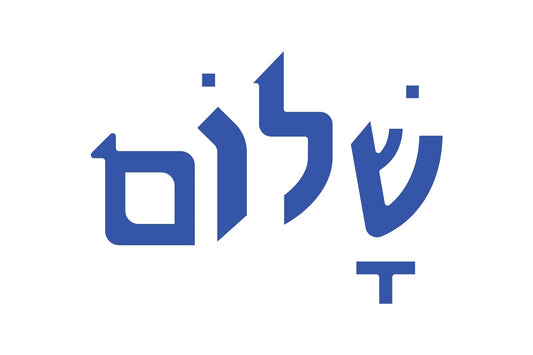
Tu BiShvat: The Jewish New Year for Trees 🌳
Tu BiShvat, also known as the Jewish New Year for Trees, is a beautiful holiday that celebrates nature, growth, and renewal. It’s a special time in the Jewish calendar when we honor the earth and our connection to the land of Israel. Tu BiShvat typically falls in late January or early February, marking the beginning of the spring season in Israel, when the first almond blossoms appear and the trees begin to bloom after a long winter.
In this blog post, we’ll explore the history and significance of Tu BiShvat, its traditions, and how it’s celebrated today. We’ll also highlight some unique products from our Oytiot shop that can help you bring the spirit of Tu BiShvat into your home.
The History and Origins of Tu BiShvat
The origins of Tu BiShvat date back to the times of the Second Temple in Jerusalem. It was initially a day marking the agricultural cycle in ancient Israel. The holiday served as a cutoff date for calculating the age of fruit trees and determining when the fruit was ready to be harvested according to Jewish law. In Leviticus 19:23-25, it is written that fruit from newly planted trees should not be eaten for the first three years, while the fruit of the fourth year is to be offered to God. After that, the fruit is considered permissible for consumption.
Over time, Tu BiShvat evolved from a practical agricultural date to a celebration of trees, nature, and the environment. In the 16th century, Jewish mystics in the city of Safed, Israel, began holding a special Tu BiShvat seder, similar to the Passover seder. This ritual meal includes eating specific fruits, drinking wine, and reciting blessings, all symbolizing the different aspects of nature and spiritual growth.
The Traditions of Tu BiShvat
While Tu BiShvat is not one of the major Jewish holidays, it has become an important time to focus on environmental awareness and our connection to the earth. Here are some of the key traditions and customs associated with this holiday:
-
Planting Trees: One of the most well-known customs of Tu BiShvat is the planting of trees. In Israel, communities, schools, and families participate in tree-planting activities, helping to reforest the land and honor the environment. This tradition has become a symbol of renewal and sustainability.
-
Tu BiShvat Seder: The Tu BiShvat seder, inspired by the Kabbalists of Safed, is a ritual meal that involves eating fruits and nuts associated with the land of Israel. These include the Seven Species mentioned in the Torah: wheat, barley, grapes, figs, pomegranates, olives, and dates. The seder often includes four cups of wine, each symbolizing the changing seasons.
-
Eating Fruits and Nuts: On Tu BiShvat, it is customary to eat a variety of fruits and nuts, especially those that are native to Israel. Many people choose to eat dried fruits, such as figs, dates, and apricots, as well as fresh fruits like pomegranates and almonds, which represent the first blooms of spring.
-
Environmental Awareness: In recent years, Tu BiShvat has become known as the Jewish Earth Day. It’s a time to focus on environmental issues, such as conservation, reforestation, and sustainable living. Many Jewish communities use this holiday as an opportunity to promote eco-friendly practices and teach the importance of taking care of the planet.
Tu BiShvat in Modern Jewish Culture
Today, Tu BiShvat is celebrated around the world as a time of renewal, growth, and connection to nature. In Israel, the holiday often coincides with the first signs of spring, when the almond trees (shkediya) begin to blossom. It’s a time when families take walks in nature, enjoy picnics under the trees, and participate in activities that support the environment.
In Jewish communities outside of Israel, Tu BiShvat is celebrated with similar customs. Families gather for a Tu BiShvat seder, schools hold educational events about the environment, and many synagogues organize tree-planting or fundraising activities to support environmental causes in Israel.
Tu BiShvat is also a wonderful opportunity to reflect on our personal growth. Just as trees grow and renew themselves each year, so too can we take this time to set intentions for our own spiritual and personal development.
Wishing you a joyful and fruitful Tu BiShvat! May this holiday bring growth, renewal, and a deeper connection to the natural world. 🌳🍇







